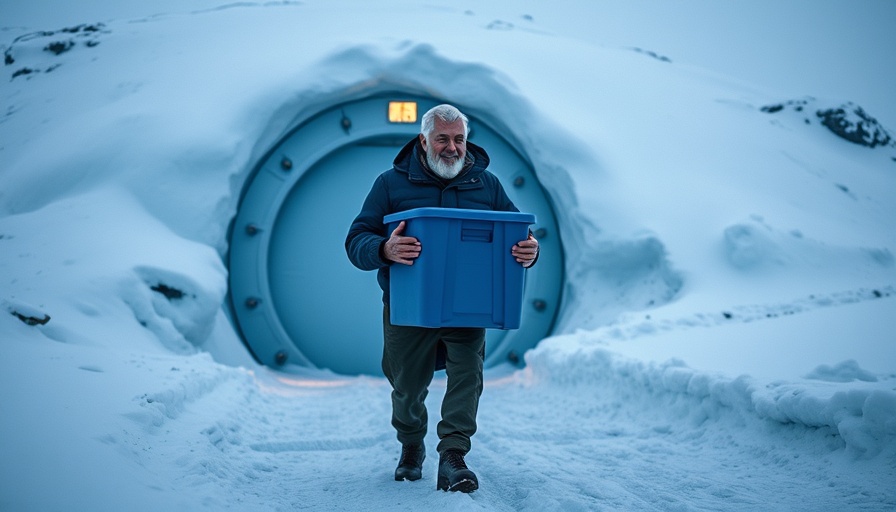
Preserving the Seed of Life: Svalbard’s Crucial Role
The recent addition of over 14,000 crop seeds to the Svalbard Global Seed Vault marks a significant milestone in global agricultural preservation. As climate change and geopolitical tensions threaten food security, the importance of this facility cannot be overstated. Designed to withstand disasters of all forms, Svalbard is humanity's insurance policy, safeguarding the genetic diversity of our crops for future generations.
The Global Seed Supply: Who Contributes?
Among the most notable contributors to the latest deposit are countries such as Sudan, the Philippines, and Brazil. Sudan deposited 15 seed samples, including vital varieties of sorghum and pearl millet, to replenish stocks devastated by civil strife. As Ali Babikar from Sudan's Agricultural Plant Genetic Resources Conservation and Research Centre states, these seeds are a beacon of hope, symbolizing resilience in the face of adversity.
Meanwhile, the Philippines has made significant contributions aimed at safeguarding its agriculture from the ravages of climate-related disasters. Ranked as the most vulnerable country to natural disasters according to the World Risk Index, the Philippines relies heavily on its genebanks to protect vital seed varieties like rice beans and Lima beans. Hidelisa de Chavez, a researcher at the University of the Philippines, emphasized the importance of these deposits, stating that seed conservation is crucial to ensure a stable food supply amid increasing climate volatility.
How Svalbard Functions as a Global Safety Net
The Svalbard Global Seed Vault operates like an external hard drive for global agriculture. While various genebanks around the world function as primary repositories for seed diversity, Svalbard acts as a backup designed to withstand calamities that might wipe out local seed banks. The most recent deposit, which includes diverse crops from Malawi and Brazil, not only bolsters this genetic safety net but also highlights a growing awareness of the urgent need to protect agricultural biodiversity.
As Nolipher Mponya of Malawi aptly points out, preserving crop diversity is crucial for mitigating food crises globally. With rising temperatures and unpredictable weather patterns, the need for robust genetic options for farmers is greater than ever. The seeds stored within Svalbard are not merely backup plans; they represent hope for an adaptive agricultural future.
Diversity in Resilience: The Importance of Climate-Hardy Crops
The seeds being stored at Svalbard include drought-tolerant and nutrient-rich varieties known as "opportunity crops." These crops are critical in adapting to climate changes, allowing farmers to maintain yields amidst extreme conditions. The addition of species like Mucuna pruriens, a nitrogen-fixing legume from Malawi, serves as an example of this adaptation. Such crops enhance soil health and agricultural sustainability, crucial aspects in the fight against hunger and food insecurity.
Future Predictions: What Lies Ahead for Global Agriculture?
Looking to the future, the deposits at the Svalbard Vault signal an increasingly proactive approach to agricultural preservation. As fears regarding climate change intensify, reliance on this global safety net will likely grow. Moreover, the participation of emerging economies in such initiatives could lead to innovative agricultural practices that develop alongside ongoing environmental challenges.
Calls for Action: The Importance of Custodianship in Agriculture
A clear takeaway from this ongoing dialogue around seed preservation is the necessity for global cooperation in agriculture. As decision-makers are urged to support international efforts like the Svalbard Global Seed Vault, it becomes evident that safeguarding agricultural diversity transcends borders. Individuals and organizations must recognize their role in this broader narrative—calling for action to contribute to local seed banks and supporting policies designed to protect agricultural resources.
By acknowledging the urgent challenges facing agriculture today and engaging in proactive measures, we can ensure that future generations will not only inherit these vital seeds but also the knowledge and practices needed to utilize them effectively.
 Add Row
Add Row  Add
Add 




Write A Comment